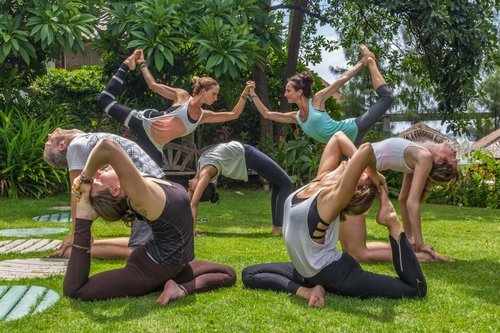Yoga Teacher Training in Rishikesh: A Blend of Culture and Practice

Rishikesh, nestled in the foothills of the majestic Himalayas along the banks of the holy River Ganges, is often referred to as the Yoga Capital of the World. This spiritual town in northern India has attracted yogis, saints, and spiritual seekers for centuries. It is not only revered for its serene natural setting and divine energy but also for being a central hub for authentic yoga education. For aspiring yoga teachers and dedicated practitioners, undertaking a Yoga Teacher Training in Rishikesh offers a holistic blend of traditional knowledge, cultural immersion, and transformative self-growth.
The Spiritual Significance of Rishikesh
The essence of Rishikesh lies in its deep spiritual roots. The town is associated with numerous saints and sages who have meditated and taught yoga here over the ages. It is believed that Lord Rama and his brother Lakshmana performed penance in Rishikesh after the battle with Ravana. With such a rich mythological and spiritual history, the energy of the place itself fosters introspection, inner peace, and a yearning for higher consciousness.
Ashrams and temples dot the town, and the sound of sacred chants and temple bells fills the air. This unique spiritual ambiance creates the perfect setting for Yoga Teacher Training, as students are immersed not just in physical postures but in an environment that nurtures the soul.
A Holistic Approach to Yoga Education
Yoga in Rishikesh is taught in its traditional form, which goes far beyond the asanas (physical postures) that many associate with yoga in the modern world. Most YTT programs in Rishikesh are structured according to the guidelines set by the Yoga Alliance, offering 200-hour, 300-hour, and 500-hour certifications. These courses encompass all eight limbs of yoga as described in the Yoga Sutras of Patanjali.
Participants dive deep into:
Asana practice: Learning the correct alignment, benefits, and modifications of various postures.
Pranayama: Mastering the control of breath, which is key to regulating life force and enhancing inner calm.
Meditation: Developing concentration and mindfulness through different meditative techniques.
Yoga philosophy: Studying ancient scriptures like the Bhagavad Gita, Hatha Yoga Pradipika, and Yoga Sutras.
Anatomy and physiology: Understanding the human body from both a Western scientific and yogic perspective.
Teaching methodology: Gaining practical experience in leading yoga classes, adjusting students, and cultivating the voice of a teacher.
This multidimensional training ensures that graduates not only become skilled instructors but also evolve as dedicated yogic individuals, carrying forward the essence of yoga both on and off the mat.
The Cultural Experience
One of the most unique aspects of training in Rishikesh is the cultural exposure that students receive. Living in ashrams or yoga schools provides an opportunity to experience the simplicity and discipline of yogic life. Participants often follow a daily routine that includes early morning meditations, sattvic meals, self-study (svadhyaya), and regular practice.
Local festivals, temple ceremonies, Ganga Aarti (a beautiful evening ritual on the riverbank), and interactions with local saints and teachers offer a deep connection to Indian culture and spirituality. The traditional Indian lifestyle reinforces the values of non-violence, self-discipline, humility, and gratitude—principles that are foundational to yoga.
Additionally, students can explore nearby spiritual towns like Haridwar or trek into the Himalayas for nature retreats and silent meditations. These excursions enhance the yogic journey and provide a broader perspective on the interconnectedness of life and nature.
Highly Qualified and Experienced Teachers
Rishikesh is home to some of the most respected yoga gurus and scholars in the world. Many have decades of experience in teaching both Indian and international students. They blend classical teachings with modern-day applicability, making yoga relevant to today’s world.
The personalized guidance and mentorship provided by these teachers often become one of the most cherished aspects of the training experience. Their wisdom, compassion, and authenticity leave a lifelong impact on students, inspiring them to embody the teachings rather than just memorize them.
A Diverse Global Community
Every year, students from across the globe travel to Rishikesh to pursue yoga training. This convergence of diverse backgrounds, cultures, and perspectives creates a supportive and inclusive learning environment. Whether you’re a complete beginner or an advanced practitioner, the community spirit of shared learning, practice, and transformation makes the experience enriching and memorable.
Friendships formed during these intensive trainings often turn into lifelong bonds, and many graduates go on to collaborate or travel together in their yoga journeys.
Affordable and Immersive Training
Compared to yoga teacher training programs in the West, courses in Rishikesh are often significantly more affordable. Despite the lower cost, the quality of education and depth of experience are unmatched. Many packages include accommodation, meals, and study materials, offering a fully immersive and stress-free learning environment.
Moreover, the simplicity of life in Rishikesh allows students to disconnect from material distractions and focus inward. The vegetarian meals served are often prepared with Ayurvedic principles, further supporting the detoxification and rejuvenation of body and mind.
Transformation Beyond Certification
While the primary goal for many is to become a certified yoga instructor, the deeper transformation that occurs during YTT in Rishikesh is truly priceless. Students often report enhanced self-awareness, emotional healing, physical well-being, and a stronger sense of purpose. The training acts as a catalyst for personal evolution, redefining one’s relationship with the self and the world.
Graduates leave not just with a certificate, but with a new outlook on life. They carry forward a toolkit of spiritual and physical practices that serve them for years to come, whether they choose to teach yoga or integrate its principles into their daily life.





